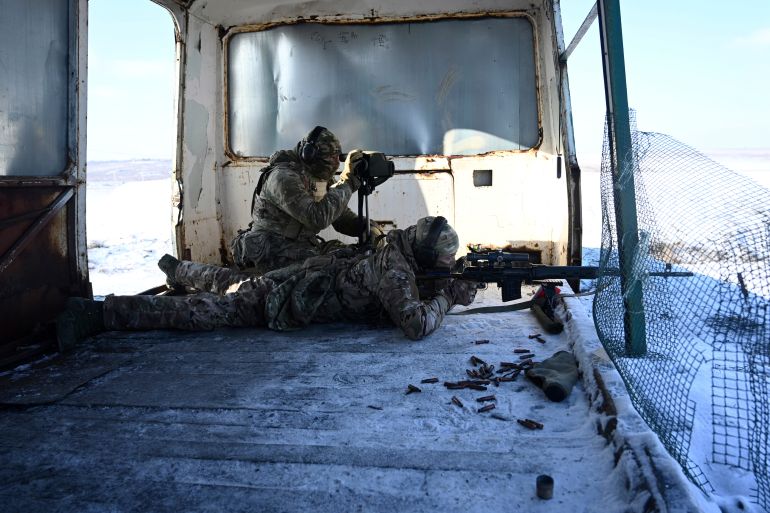Blinken to travel to Ukraine amid fears of Russian invasion
US Secretary of State visit comes after talks between Moscow, Washington and NATO failed to make progress last week.

United States Secretary of State Antony Blinken is set to travel to Kyiv following a week of diplomacy between Washington, Moscow, and NATO countries that failed to ease heightened tensions along the Russian-Ukrainian border.
Blinken will fly to Ukraine on Tuesday before meeting Ukrainian President Volodymyr Zelenskyy and Foreign Minister Dmytro Kuleba the next day, the Department of State said.
Keep reading
list of 3 itemsCrisis over Ukraine | Start Here
Russia demands US, NATO response next week on Ukraine
The visit is meant to show solidarity with Ukraine amid a Russian troop build up along the two country’s shared border that has continued to stoke fears of an invasion similar to Moscow’s 2014 annexation of Crimea.
Blinken, who will meet President Volodymyr Zelenskyy in Kyiv on Wednesday, will “reinforce the United States’ commitment to Ukraine’s sovereignty and territorial integrity,” Department of State spokesman Ned Price said.
Blinken will then travel to Berlin on Thursday for four-way talks with the United Kingdom, France and Germany on the Ukraine crisis.
The four transatlantic powers will discuss “joint efforts to deter further Russian aggression against Ukraine, including allies’ and partners’ readiness to impose massive consequences and severe economic costs on Russia”, Price said in a statement.
Shortly after announcing the trip, the State Department said that Blinken on Tuesday spoke by phone with his Russian counterpart Sergey Lavrov and stressed “the importance of continuing a diplomatic path to de-escalate tensions surrounding the deeply troubling Russian military build-up in and near Ukraine”.
Blinken reiterated the “unshakable US commitment to Ukraine’s sovereignty and territorial integrity” during the call, the State Department said.
The most recent diplomatic flurry comes after extensive talks between Washington, Moscow, and several European nations, including a one-on-one meeting with senior diplomats from both the US and Russia in Geneva, failed to lead to any breakthroughs last week.
On Tuesday, NATO chief Jens Stoltenberg also announced that he had invited Russia to again attend a series of meetings to find a way forward to prevent a military attack on Ukraine. Russia did not immediately comment on the invitation.
Moscow has amassed about 100,000 troops, as well as tanks and other heavy weapons, along the eastern border of Ukraine, but has repeatedly denied that it plans to again invade its neighbour.
Still, amid the escalation, Russia has demanded binding guarantees from Western countries that NATO will not grant membership to Ukraine or station its forces and weapons there. Washington and its European allies have firmly rejected those demands.
On Friday, the White House said that US intelligence officials had concluded that Russia had already deployed operatives to rebel-controlled eastern Ukraine to carry out acts of sabotage there and blame them on Ukraine to create a pretext for a possible invasion.
On Monday, Russian military forces and hardware began arriving in Belarus, which borders Ukraine to the north, in preparation for what both countries have described as a rehearsal for repelling an external attack.
Meanwhile, a delegation of US senators visited Ukraine on Monday to emphasise bipartisan congressional support for the country, while German Foreign Minister Annalena Baerbock, speaking from Kyiv, warned that “any further escalation would carry a high price for the Russian regime – economic, political and strategic” while emphasising the need to continue negotiations.
The US has also warned of major economic consequences for Moscow, and has voiced hope that Germany would sever the soon-to-open Nord Stream 2 gas pipeline if Russia invades.
On Tuesday, German Chancellor Olaf Scholz, when asked about the prospect of severing Nord Stream 2, responded, “There will be a high price to pay and that everything will have to be discussed should there be a military intervention in Ukraine.”
Speaking on CNN on Sunday, the Kremlin’s chief spokesman Dmitry Peskov again denied that Moscow is “threatening anyone with military action”.
However, he said that Russia would be forced to take “counteractions” if Washington continues to rebuff Moscow’s demands for an end to NATO expansion to the east and deployment of troops and weapons in former Soviet states.